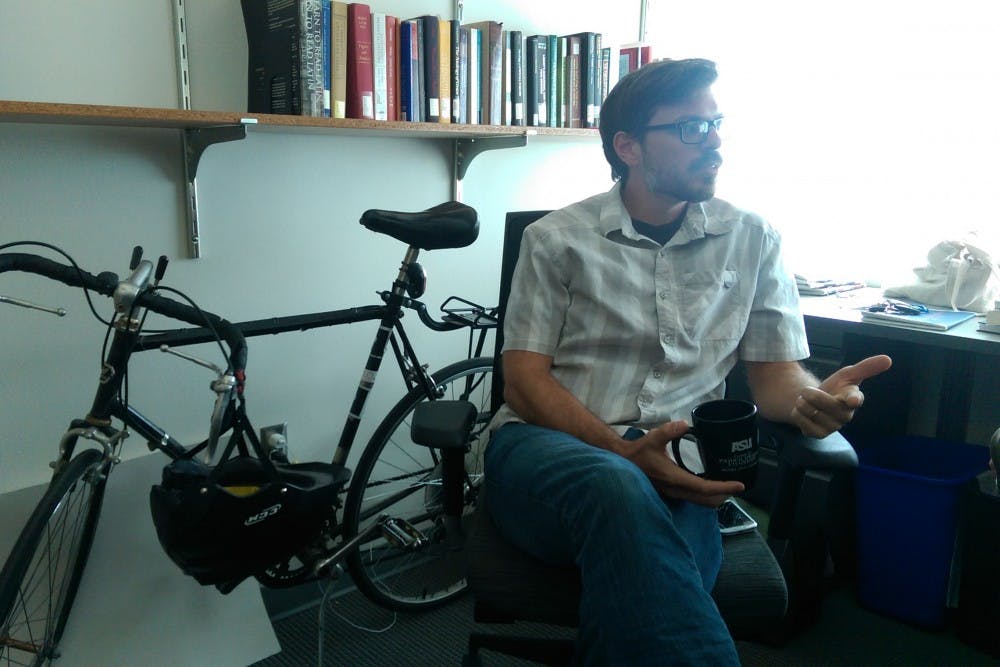In the midst of a particularly polarized election season, many who are new to the political process have wondered: How did we get to this point?
The Center for Political Thought and Leadership, organized under the School of Historical, Philosophical and Religious Studies at ASU, seeks to answer that question by teaching students about the history of politics — from its origin to its present condition — to foster leadership characteristics and job opportunities for student graduates.
Professor Donald Critchlow, who founded the center in 2014, said the organization offers an undergraduate certificate in political thought and leadership. This program has nearly 70 students enrolled and offers two required classes to make students better political thinkers and leaders in society.
“'Foundations of Democracy' is designed for students to read short excerpts from great thinkers on democracy as well as issues within the history of democracy,” Critchlow said. “The leadership seminar, which is required, brings leaders from the community, business and public affairs in to talk to the class.”
Critchlow said the point of the curriculum isn’t just to facilitate political advocacy, but also to help students figure out their beliefs on a foundational level and to use such beliefs to become better leaders in any career.
“Many of our students are in business and economics,” Critchlow said. “It’s not just training them to be politicians, or even community leaders, but to be leaders in business. So we present them with the foundational principles … and let them decide what their foundational beliefs are."
Critchlow said the organization emphasizes healthy, challenging debate and presentation of ideas from those of all political stances.
“We believe in free speech and free intellectual discussion and the testing of ideas, too, as opposed to just being an echo chamber where everybody agrees with you whether it’s on the left, right, or wherever it is,” Critchlow said. “Too often students as well as faculty are just echoing themselves and agreeing and not challenging themselves.”
Mauricio Suchowlansky, 36, who is a postdoctoral associate for the Center, said one of the most interesting facets of the organization is its curriculum, which teaches students about the origins and history of politics leading back the the ancient Greeks rather than just politics as it stands today.
“The Center isn’t just a great books program, it’s rather a two-way avenue between the great books and the development of a cognizant and aware citizenry,“ Suchowlansky said. “By engaging students with the great books, we foster the enlargement of their civic horizons in the present.”
Suchowlansky said that though the Center's curriculum mainly tackles historical Western thought in politics, he makes sure to cover as much ground as he can when he leads discussions with students.
“We seek to foster the importance of the Western canon of ideas onto our students, but that doesn’t necessarily mean we only tackle Western ideas ... for instance, my next Monday dialogue is not on a Western thinker,” Suchowlansky said. “What I’m seeking to do … is to use a mirror-image for students to better understand and critically analyze the core values of American society.”
Daniel Strand, 37, who is also a postdoctoral associate for the Center, said the example set from this election season indicates that students should focus on literature that describes the origins of political thought to gain a better understanding of today's Western politics.
“I think we all share a sort of feeling that it’s very easy to get lost in the (real) immediacy of just elections and your candidates … and miss the deeper undercurrents and the history we’re all indebted to, and so I think we want people to appreciate that,” Strand said.
He said it's important for students to learn about ancient great thinkers to better understand how politics and citizenship is structured.
“When you think about citizenship, you should be reading Plato, you should be reading Machiavelli, you should be reading Locke, you should be reading all these people who shape the ways that we think profoundly, but we don’t maybe return to as much," Stand said.
Although the majority of students in the Center are conservative, Strand said the organization has no political agenda unlike many marginalized political groups on campus, and thrives purely on diverse, intellectual discussion over the foundational process of politics.
“We bring in people from business, people from nonprofits, political leaders, people from all venues of life and from all political spectrums, and that’s very important,” Strand said. “It’s nonpartisan.”
Reach the reporter at angel.n.mendoza@asu.edu or follow @angelnikolas96 on Twitter.
Like The State Press on Facebook and follow @statepress on Twitter.




